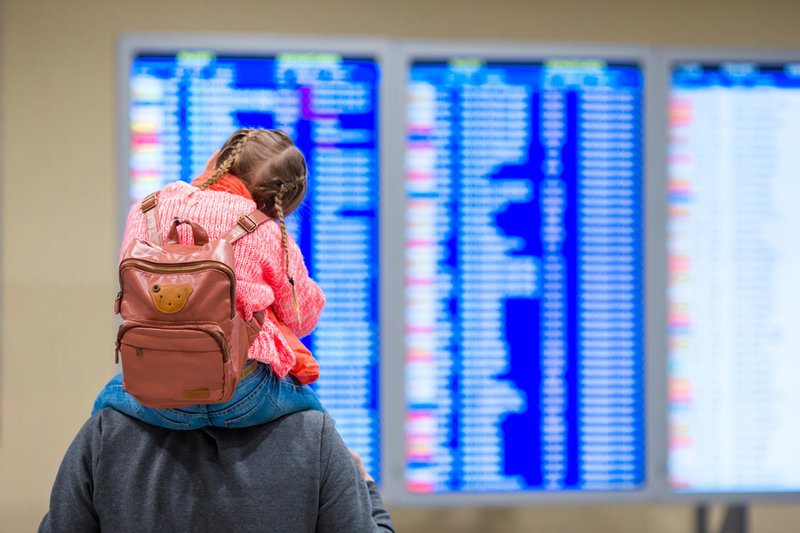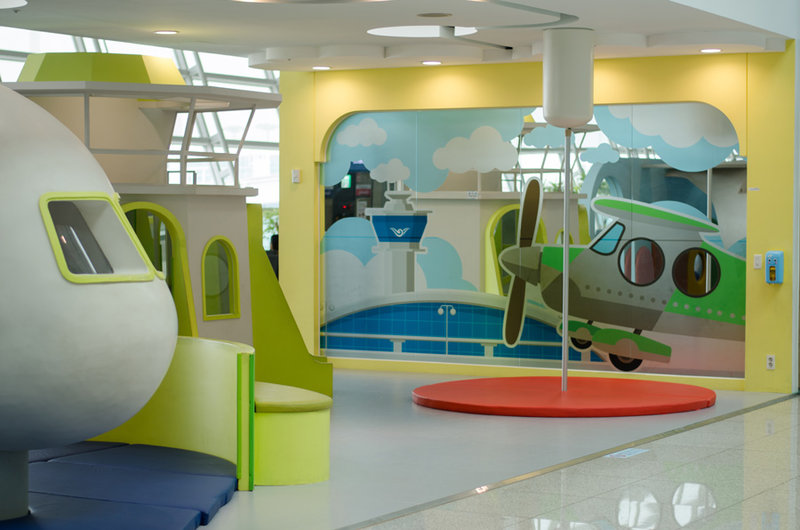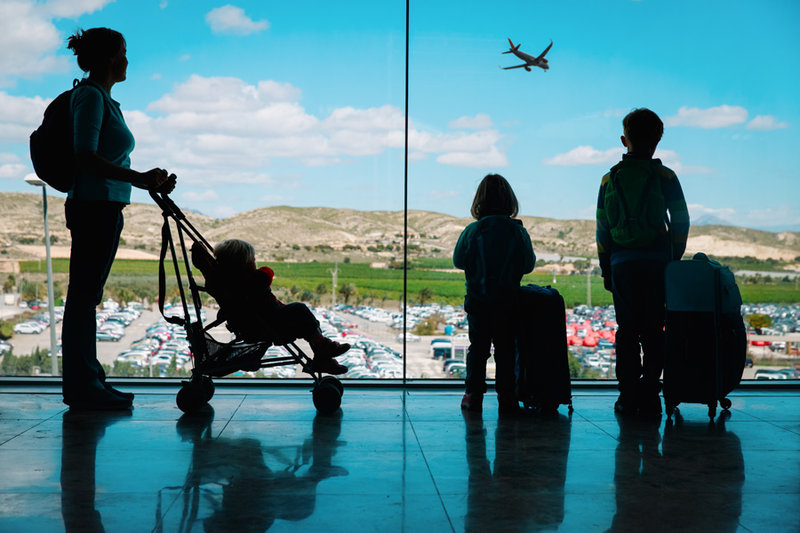Passenger services
My first airport:
should aviation hubs do more to appeal to children?
Flying can still be a traumatic experience for children and families. Joe Baker finds out how airports are factoring a younger demographic into their designs and services, and what the potential commercial benefits are
N
ew innovations in baggage handling, security systems and digital flight displays are helping to create a more seamless environment at airports. However, for passengers with young children, the overall experience can still be a nightmare – particularly if a flight is delayed.
Airports have been receiving praise in the media for taking steps to better accommodate travellers with children. In August, Netflights.com released a list of the most family-friendly airports in the UK, Ireland and the Channel Islands, based on polling data. Unsurprisingly, higher scoring hubs had better flight punctuality records and offered a range of specialised amenities, including designated baby changing areas, express security lanes, water fountains and free Wi-Fi.
Birmingham Airport came on top of the list, an achievement that head of customer experience Stuart Haseley-Nejrup seems particularly happy about. He says that in the last couple of years, the culture at the airport has changed to place an even greater emphasis on passenger accessibility.
“I think there’s been a very open acceptance from the board and our shareholders to invest in this area,” he says. “We're getting more and more families through the airport and I think the reason is that we have made it easier to use airport facilities.”
Passenger numbers are increasing and duty-free opportunities are opening up to welcome a new wave of millennial parents with sky-high expectations. The pressure is therefore building for airports to improve their service offering for a younger demographic.
Caption.
Image courtesy of
Fast-track to success
Getting children through an airport quickly is key for minimising stress, which is why many aviation hubs have begun advertising specialised queue-skipping options for families. At some facilities, this begins at arrival. Liverpool Airport, for example, offers a Family Fast Track service with larger parking spaces within walking distance of the terminal for incoming groups.
A number of airports across Europe and the US have also introduced dedicated fast-track security lanes for families, speeding up their journey to the departure lounge. Haseley-Nejrup says that Birmingham Airport has ensured its security staff can keep children at ease during mandatory scanning procedures, providing them with specially developed stickers as a reward for completing the process.
Some airport operators have established entire new mascot-led brands to make their services more enticing for children. In partnership with Oslo Airport, design consultancy EGGS created Felix and Fiona – a service branding that spans the airport’s numerous amenities, including children’s play areas, nursing rooms and even security zones.
EGGS service designer Ingvill Hoffartsays that alongside stressful security checks, a huge problem for families is insufficient information when planning a trip. Oslo Airport gathers relevant materials for parents on its website, including illustrated stories, to introduce children to various airport procedures.

Image courtesy of
“In order to attract travellers in a landscape where airports are competing with each other on offering the greatest passenger experiences, they have to work continuously on improving commercial services and airport facilities,” says Hoffart.
“We believe children and families are an important target group in this context: they have clear needs, and airports that adapt to these needs, making travel as easy, comfortable and fun as possible for families, are perceived as attractive places for waiting, eating, shopping and relaxing during travel.”
Airports also score points with parents of very young children by offering courtesy pushchairs and baby changing facilities. Amsterdam Schiphol features a Baby Care Lounge that offers private spaces where passengers can bathe, feed and let babies rest in one of seven cabins.
Parents looking after very young children and babies represent a ripe market for new innovation. Last year, entrepreneur Jasmin Smith introduced a new vending machine service, named Baby Vend, to provide emergency baby supplies at Ted Stevens Anchorage International Airport. US-based Mamava has found airports to be a ripe market for its moveable nursing pods, with almost 100 having been installed at North American aviation hubs.
A huge problem for families is insufficient information when planning a trip
Keeping children entertained
Many airports factor entertainment options for children into their designs. Singapore’s much-lauded Changi Airport, for example, features playgrounds, a giant slide and a massive public aviation viewing gallery across its three terminals.
Meanwhile, some airports have seized the opportunity to create educational experiences; Calgary International Airport features Space Port, a facility offering hands-on exhibits, displays and learning programmes that teach children about space travel.
Children are well and truly entrenched in their digital devices, with a study earlier this year revealing that 25% of kids aged six and under already have their own mobile phone. Haseley-Nejrup says that Birmingham Airport has invested in new technology to capitalise on the digital revolution. Using the Zappar app to scan QR codes distributed across the terminal, children are able to follow an augmented reality trail through the airport, while interacting with an on-screen version of Zoom, a friendly blue mascot.

Image courtesy of
One of the criteria in the aforementioned Netflights survey was the provision of free Wi-Fi and better connectivity. Haseley-Nejrup says that new 5G services and a programme to upgrade Wi-Fi at Birmingham Airport this November will benefit children as well as business passengers.
Airports that make themselves stand out from the crowd with exceptional child-friendly services stand to gain as a result, and this could come from a stronger focus from customer service teams. Munich Airport has introduced a dedicated project team to work on further ideas to make the hub more family-friendly.
“The project team’s first step was in cooperation with all airport divisions to bundle the existing family-friendly offers,” says spokesperson Corinna Born. “Families will now find these offers and services at a glance on Munich Airport’s website, flanked by helpful information.”
Airports that make themselves stand out from the crowd with exceptional child-friendly services stand to gain
The impact on duty-free
Keeping children busy can help airports boost their duty-free revenues, according to Peter Mohn, CEO of Swiss travel retail research agency m1nd-set.
“Vital to ensuring parents are in the right state of mind to shop in airports is of course the guarantee that children are entertained during the dwell time, which is often up to several hours,” he says. “An airport experience which gives parents the opportunity to relax while the children are entertained means both parents will have the opportunity to take turns to browse the shops.”
This year, a new m1nd-set study highlighted that duty-free retailers experience higher footfall, penetration and conversion rates among parents travelling internationally with children than those travelling without. According to the report, 48% of travellers with children enter airport shops, compared to 41% of travellers without children, while a higher percentage of the former (37%) would also make a purchase in airport shops than the latter (28%).
“The tendency for parents travelling with their children to plan their airport shopping trips more, engage with staff more and notice communications touch points more means that these passengers are looking for more out of their airport experience,” says Mohn. “Pre-travel marketing, especially in the lead-up to the peak season travel periods such as the summer and winter vacations, should therefore aim to reach parents with reassuring messages and promises of the attributes they are seeking.”

Image courtesy of
Mohn says that it will be particularly important for airports to understand the buying habits of millennial parents, which account for 40% of that age group. Over 80% of millennial parents search for shopping information online, which is over 20% more than older parents.
“Millennials spent an estimated $200bn in 2017 on shopping generally,” he says. “With many of them still destined to become parents, a significant proportion of their shopping spend will be dedicated to their children.”
“Given the online and luxury shopping trends for children’s fashion, there is a clear opportunity for duty-free retailers and brands. With the disparate un-coordinated experiences online, if duty-free retailers were to offer full collections including clothes, shoes and all accessories, with exclusive ranges not available downtown, they will undoubtedly attract the premium and luxury brand shoppers looking for something unique for their children to impress their entourage.”
Given the online and luxury shopping trends for children’s fashion, there is a clear opportunity for duty-free retailers and brands